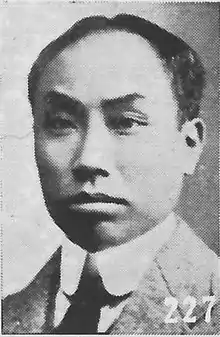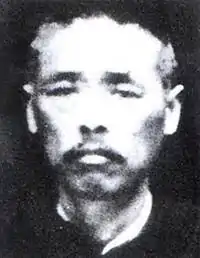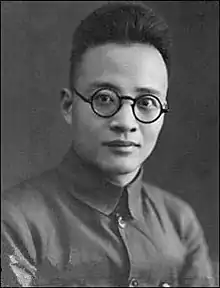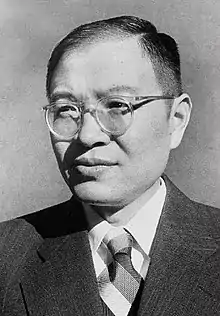| Leader of the Central Committee of the Chinese Communist Party | |||||||
|---|---|---|---|---|---|---|---|
| Simplified Chinese | 中共中央主要负责人 | ||||||
| Traditional Chinese | 中共中央主要負責人 | ||||||
| Literal meaning | CPC Central Committee primary responsible person | ||||||
| |||||||
.svg.png.webp) |
|---|
|
|
The leader of the Central Committee of the Chinese Communist Party is the highest-ranking official and head of the Chinese Communist Party (CCP). Since 1982, the General Secretary of the Central Committee is considered the party's leader. Since its formation in 1921, the leader's post has been titled as Secretary of the Central Bureau (1921–1922), Chairman (1922–1925, 1928–1931, and 1943–1982), and General Secretary (1925–1928, 1931–1943, and 1982 onwards).
By custom the party leader has either been elected by the CCP Central Committee or the Central Politburo.[1] There were several name changes until Mao Zedong finally formalized the office of Chairman of the Central Committee.[1] Since 1982, the CCP National Congress and its 1st CC Plenary Session has been the main institutional setting in which the CCP leadership are elected.[1] From 1992 onwards, every party leader has been elected by a 1st CC Plenary Session. In the period 1928–45 the CCP leader was elected by conference, meetings of the Central Committee or by decisions of the Politburo.[1] The last exception to this rule is Jiang Zemin, who was elected at the 4th Plenary Session of the 13th Central Committee in the aftermath of the 1989 Tiananmen Square protests and massacre.[2] Currently, to be nominated for the office of general secretary, one has to be a member of the CCP Politburo Standing Committee.[3]
Despite breaching the Constitution of the Chinese Communist Party, several individuals (who are not included in the list) have been de facto leaders of the CCP without holding formal positions of power.[4] Wang Ming was briefly in charge in 1931 after Xiang Zhongfa was jailed by Kuomintang forces, while Li Lisan is considered to have been the real person in-charge for most of Xiang's tenure.[4] Deng Xiaoping is the last CCP official to achieve this; he became de facto leader of the CCP and paramount leader of China despite having never served as chairman or general secretary, his highest post being Chairman of the Central Military Commission (commander-in-chief). [5]
Leader offices
| Title | Existence | Established |
|---|---|---|
| Secretary of the Central Bureau | 1921–1922 | 1st National Congress |
| Chairman of the Central Executive Committee | 1922–1923 | 2nd National Congress |
| General Secretary of the Central Bureau | 1923–1925 | 3rd National Congress |
| General Secretary of the Central Executive Committee | 1925–1927 | 4th National Congress |
| General Secretary of the Central Committee | 1927–1928 | 5th National Congress |
| Chairman of the Central Committee | 1928–1931 | 6th National Congress |
| General Secretary of the Central Committee | 1931–1943 | 4th Plenary Session of the 6th Central Committee |
| Chairman of the Central Politburo | 1943–1945 | Politburo resolution |
| Chairman of the Central Secretariat | 1943–1945 | Politburo resolution |
| Chairman of the Central Committee | 1945–1982 | 7th National Congress |
| General Secretary of the Central Committee | 1982–present | 12th National Congress |
Leaders
| No. | Portrait | Name (birth–death) |
Took office | Left office | Length of tenure | Central Committee | Portfolios held while leader |
|---|---|---|---|---|---|---|---|
| 1 |  |
Chen Duxiu 陈独秀 (1879–1942) |
23 July 1921 | 1 July 1928 | 6 years and 344 days | 1st (1921–1922) 2nd (1922–1923) 3rd (1923–1925) 4th (1925–1927) 5th (1927–1928) |
— |
| 2 |  |
Xiang Zhongfa 向忠发 (1879–1931) |
1 July 1928 | 24 June 1931 | 2 years and 358 days | 6th (1928–1945) |
|
| 3 |  |
Bo Gu 博古 (1907–1946) |
September 1931 | 17 January 1935 | 3 years and 138 days | 6th (1928–1945) | — |
| 4 |  |
Zhang Wentian 张闻天 (1900–1976) |
17 January 1935 | 20 March 1943 | 8 years and 62 days | 6th (1928–1945) | — |
| 5 | .jpg.webp) |
Mao Zedong 毛泽东 (1893–1976) |
20 March 1943 | 9 September 1976 | 33 years and 173 days | 6th (1928–1945) 7th (1945–1956) 8th (1956–1969) 9th (1969–1973) 10th (1973–1977) |
|
| 6 |  |
Hua Guofeng 华国锋 (1921–2008) |
7 October 1976 | 28 June 1981 | 4 years and 264 days | 11th (1977–1982) | |
| 7 | .jpg.webp) |
Hu Yaobang 胡耀邦 (1915–1989) |
29 June 1981 | 15 January 1987 | 5 years and 200 days | 11th (1977–1982) 12th (1982–1987) |
|
| 8 | .jpg.webp) |
Zhao Ziyang 赵紫阳 (1919–2005) |
15 January 1987 | 24 June 1989 | 2 years and 159 days | 12th (1982–1987) 13th (1987–1992) |
|
| 9 |  |
Jiang Zemin 江泽民 (1926–2022) |
24 June 1989 | 15 November 2002 | 13 years and 144 days | 13th (1987–1992) 14th (1992–1997) 15th (1997–2002) |
|
| 10 |  |
Hu Jintao 胡锦涛 (born 1942) |
15 November 2002 | 15 November 2012 | 10 years and 0 days | 16th (2002–2007) 17th (2007–2012) |
|
| 11 | .jpg.webp) |
Xi Jinping 习近平 (born 1953) |
15 November 2012 | Incumbent | 11 years and 57 days | 18th (2012–2017) 19th (2017–2022) 20th (2022–2027) |
|
See also
References
Citations
Sources
- General references
References for when individuals were elected to the CCP leadership offices, the name of the offices and when they established and were abolished are found below:
- Wang, Gungwu (2012). China: Development and Governance. World Scientific Publishing Company. pp. 12–13. ISBN 978-9814425841.
- 19th National Congress (2017). Constitution of the Communist Party of China Communist Party of China.
{{cite book}}: CS1 maint: numeric names: authors list (link)
- Articles and journal entries
- Dittmer, Lowell (March 1983). "The 12th Congress of the Communist Party of China". The China Quarterly. Cambridge University Press on behalf of the School of Oriental and African Studies. 93 (93): 108–124. doi:10.1017/S0305741000016192. JSTOR 653335. S2CID 154772668.
- Books
- Wu, Guoguang (2015). China's Party Congress: Power, Legitimacy, and Institutional Manipulation. Cambridge University Press. doi:10.1017/CBO9781139976800. ISBN 978-1-107-08202-1.